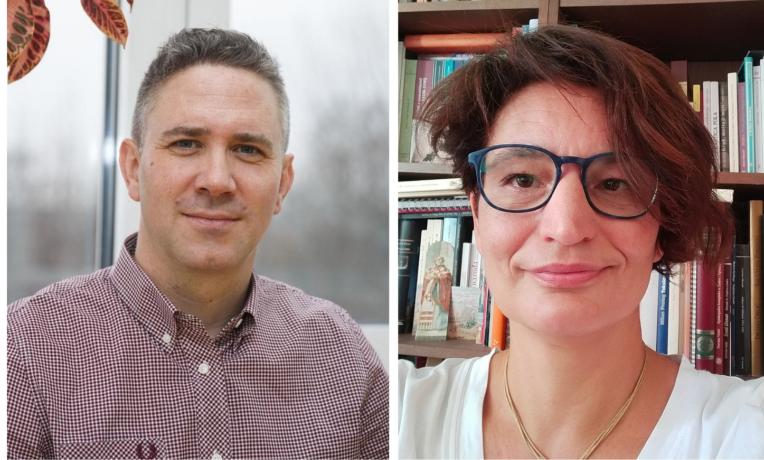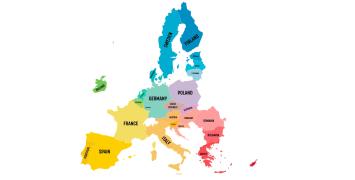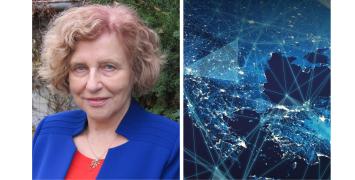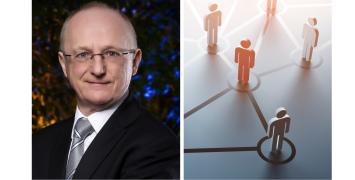Researchers’ experiences with the ERC Visiting Fellowships

Physicist Matej Praprotnik from Slovenia and architectural historian Jasenka Gudelj from Croatia share their experiences during their ERC Visiting Fellowships.
Why did you select the particular project team that you did your ERC fellowship with?
Gudelj: I looked through the projects that were possibly eligible to host me, selected a compatible one, and then wrote to the person responsible for it, whom I didn't know previously. The Principal Investigator, Angela Nuovo, was gracious enough to reply to my request and host me for three months. The project was on the early modern book trade, and as I am an architectural historian, I was able to expand my previous work on the circulation of architectural books, and it eventually became part of my own ERC project.
Praprotnik: I visited Petros Koumoutsakos’ group for six months, a computational science and engineering laboratory, one of the top groups in the field of multiscale simulation and at that time based in at ETH, Zurich. I had visited this group already 10 years previously. They are working in similar field to me, but more towards engineering side, I'm more towards physics.
What did you learn or exchange during your stay with them?
Gudelj: They were very generous. They organised a lecture for me and invited me to give some of the results of the research that I was doing. I helped them with some bibliography written in Slavic languages that I can read. So it also became a space of scientific exchange.
Praprotnik: My previous research had developed mature numerical methods for nanofluidics, and with my ERC project I wanted to apply this methodology to a completely different field. I wanted to investigate a scientific challenge, ultrasound targeted drug delivery, which offers a lot of opportunity for treatment of cancer or inflammation, because it's a very non-invasive method. While there was a lot of experimental development in this field, there was not much theoretical. During my fellowship I gained more experience in multiscale methods necessary for my project.
Was there anything particularly useful for preparing your own ERC application?
Gudelj: This was a precious experience on different levels. I discovered so much helpful information about writing up a grant. Some of the unwritten rules of how to do it, about the whole evaluation process, and then about the team composition and how to hire it, because it needs to equally respond to your own project needs and also “Brussels” rules, and then obviously local rules. Spending three months with the EMoBookTrade team showed me that ERC projects are a doable endeavour. Moreover, I learned what kind of administrative support I would need to run the project smoothly.
You have to look into what can be done for such an amount of time and such an amount of money. This was really valuable for thinking about how to configure the research and the research project, to work on a budget and to work within the possibilities of employment, but also balancing with other things that need to be financed through the project.
Praprotnik: You get the idea how to present the project because there are certain guidelines how to do it. It was also a bit of sabbatical during which I could organize myself and think a lot about the project. It did improve my chances.
What was very important for me was that by accepting this grant you oblige yourself to apply (for ERC funding) within the next two years. I think it's quite motivational. That year the deadline for the Advanced Grant call was end of August. For me it was perfect because after the fellowship finished, during summertime, I had no other distractions - there were not many people in the office. I had peace, it was really productive. I almost had the feeling like I was writing a PhD thesis.
Is there anything that you think could be improved about the fellowship programm?
Gudelj: What is actually missing if you want to expand for the underrepresented countries, it is not only the grantees that need to pass through the program but also administrative people. In my case, before my project started, I unfortunately realised that my original host institution in Zagreb would not meet my specific administrative needs. I therefore used my “portability” option to move my project to Ca’ Foscari university in Venice.
Also, what needs to change is the general academic climate. This means promoting the grants as something extremely positive for everyone at the host institution and advancing the discipline locally, not something foreign from the local system. This is less the case in hard sciences but more in humanities and social sciences, which are more locally based and language-oriented.
Praprotnik: I think the fellowship was perfect but this is just one part of the whole story. Why do we need these fellowships in the first place? Because Europe is not equally developed. The European Union is very diverse, as are all the issues and challenges that you have to address in each country. If you just invest in, for example, this fellowship, this is not enough, you must complete the full circle.
Not only getting the grant can be challenging, executing it can be too. All the necessary things need to be in place in order to make sure the project is a success.
European legislation is implemented at different times and in different ways in the various EU countries. If it isn’t in place, then PIs cannot carry out their project in an optimal way.
In Slovenia scientists, as public sector employees, have salary caps. Academic salaries in my field of high-performance computing are really not competitive in comparison to those offered by big players outside academia. So, it can be very difficult to attract the right people.
A recently approved law in Slovenia would make it possible to increase salaries using ERC funds. While my institute is supporting me to the fullest extent possible, it’s waiting for our ministry to start executing the new law. For this reason, I already initially postponed the start of my ERC project. However these changes are really slow and we don’t have time to wait; we only get ERC funding for limited number of years. Recently, to be able to offer better salaries to postdoc researchers, I therefore transferred part of my project group to the University of Barcelona.
Bios
Matej Praprotnik
Matej Praprotnik is Head of the Laboratory for Molecular Modeling at the National Institute of Chemistry and professor of Physics at the Faculty of Mathematics and Physics, University of Ljubljana. His research is focused on computer simulation of soft and biological matter. The focus is on developing and combining innovative computational and theoretical methods, augmented by machine learning techniques, to study complex molecular systems.
Visited ERC-funded project: Petros Koumoutsakos, FMCoBe: Fluid Mechanics in Collective Behaviour: Multiscale Modelling and Applications, at ETH Zurich. After completion of ERC project, the research group moved to Harvard.
Own ERC-funded project: MULTraSonicA: Multiscale modeling and simulation approaches for biomedical ultrasonic applications
Jasenka Gudelj
Jasenka Gudelj is an Associate professor at Ca’ Foscari University, Venice. Formerly Associate professor at the University of Zagreb (2000-2020), she specialises in history of architecture of the Adriatic region. Prof Gudelj obtained her PhD from School of Advanced Studies in Venice, and was a postdoctoral fellow at University of Pittsburgh and Bibliotheca Hertziana, Rome.
Visited ERC-funded project: Angela Nuovo, EMoBookTrade: The Early Modern Book Trade: An Evidence-based Reconstruction of the Economic and Juridical Framework of the European Book Market. During the course of the ERC funded project the research group moved to Milan.
Own ERC-funded project: AdriArchCult: Architectural Culture of the Early Modern Eastern Adriatic.




